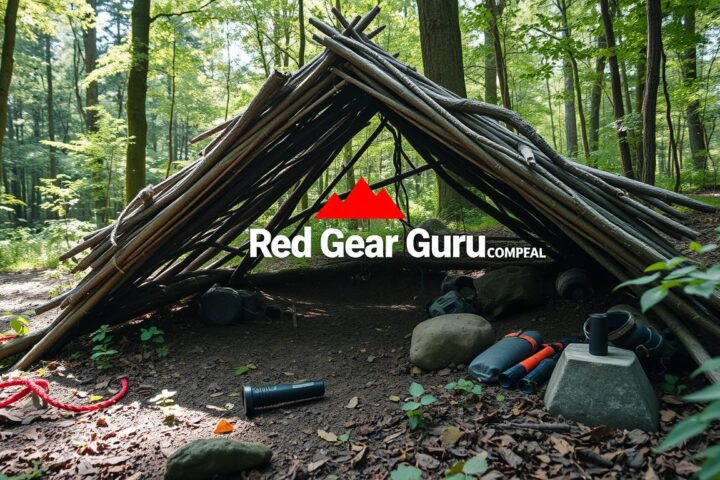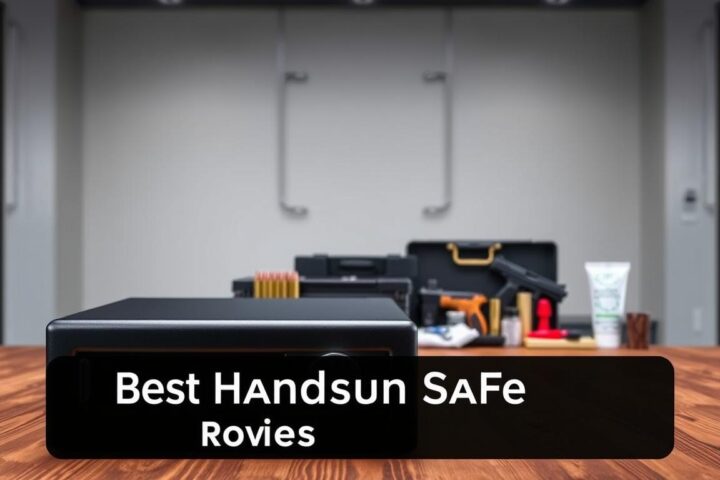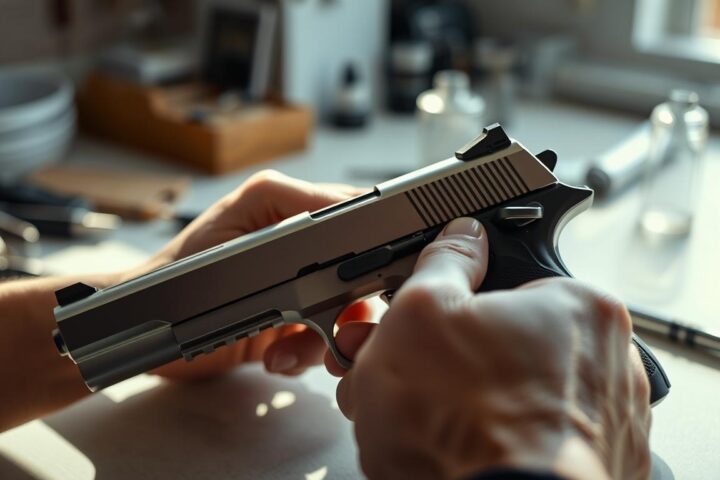The COVID-19 pandemic in the U.S. has shown us how vital mental preparedness is during crises. With over 5 million cases reported by August 2020, the need for emotional strength and crisis handling is clear. Mental preparedness is key to survival, helping us stay calm, make smart choices, and get through tough times.
Being able to keep cool and act right is crucial. Fear can make even the bravest people freeze. To survive an emergency, you need mental strength to stay hopeful, patient, calm, and confident. These qualities are what keep you alive.
Key Takeaways
- Mental preparedness is crucial for survival, beyond just physical readiness.
- Maintaining composure and making critical decisions are vital skills in emergencies.
- Staying positive, resilient, and confident can help you endure even the most challenging situations.
- Emotional resilience and crisis management are essential for navigating crises effectively.
- Developing mental toughness can enhance your chances of survival in an emergency.
Importance of Mental Preparedness in Emergencies
Being calm and mentally ready is key when you’re in a emergency. The fight or flight response kicks in, making your heart race and your blood pressure go up. This response helps you act fast, but it can also make you shake, think too much, and feel overwhelmed. Knowing how your body reacts to helps you see it as a tool, not a problem. This way, you can use your body’s natural response to perform better in tough times.
Understanding the Physiology of Stress
When you’re in danger, your body releases hormones like epinephrine and norepinephrine. These hormones make your body ready for action. This fight, flight or freeze response is helpful, but it can also make you feel and think differently. These feelings might make it harder to make good decisions if you don’t know how to handle them.
Learning about how stress affects your body helps you spot when your body is getting ready to react. You can then find ways to use that energy well in emergencies.
Developing Mental Toughness
Building mental toughness is key for getting ready for survival. Studies show that mental toughness can come from nature, but it can also be learned. Doing tough physical fitness exercises, living a disciplined life, and trying new things can make your mind and body stronger.
Physical Fitness and Discipline
Pushing yourself to the limit can boost your strength, stamina, and confidence. Physical conditioning is vital for a survivor mindset. It trains your body to be strong, fit, and healthy, which helps you survive better.
Stepping Out of Your Comfort Zone
Getting used to discomfort and challenging yourself can build resilience and mental toughness. Overcoming challenges, whether they’re physical or mental, teaches you discipline and problem-solving skills. These are key for survival.
By working on yourself, you’ll get better physically and mentally. This makes you ready for the unexpected challenges you might face in the wild.
Cultivating a Positive Attitude
Keeping a positive attitude is key for survival mental preparedness. Studies show that positive thinking helps people get through tough times better. By thinking like an optimist, you become more resilient and ready for emergencies.
Thinking “I can do this” and believing in your skills helps you stay calm and focused. Many studies found that a positive attitude is linked to better health, longer life, and doing well at work.
Doing things that make you feel good, listening to happy music, and being around positive people help keep you positive. Also, taking deep breaths can calm you down and keep your mind strong during hard times.
By focusing on a positive attitude, you boost your mental preparedness and resilience. Your mindset is crucial for overcoming tough survival situations. It really can change how well you do.
Relaxation Techniques for Stress Management
Practicing relaxation techniques is key to handling the effects of stress in emergencies. Methods like meditation, mindfulness, and breathing exercises calm your mind and body. This helps you react better in tough situations. By doing these regularly, you train your brain and body to manage the stress response better. This keeps you calm and focused when it counts.
Meditation and Mindfulness
Meditation and mindfulness are great for stress management. They help you focus on now and watch your thoughts and feelings without judging them. This reduces stress and brings calm inside you. Try different meditation methods, like body scans or guided imagery, to see what works for you.
Breathing Exercises
Breathing exercises are a good way to trigger the relaxation response in your body. Deep breathing lowers your heart rate and stress hormones. Try deep breathing exercises or box breathing. Do these daily to improve how you handle stress in emergencies.
Remember, the best stress management comes from finding what works for you and doing it often. By spending time on these practices, you’ll be more ready to stay calm and focused in tough times.
survival mental preparedness, staying calm in emergencies
Surviving an emergency isn’t just about having the right gear. It’s also about being mentally ready and staying calm. When disaster hits, how you react can be the key to survival. By having the right mindset and strategies, you can handle tough situations with focus and strength.
Research shows that stress can make it hard to think clearly or remember important details. This happens because our body’s fight, flight, or freeze response kicks in. But, with mental preparation, you can control this response and keep your thinking clear.
- Acknowledge Reality: Understanding the situation clearly helps you make better decisions.
- Breathing Exercises: Deep breaths calm your nerves and help you stay focused.
- Regular Exercise: Working out lowers stress hormones and increases happy feelings.
- Healthy Diet: Eating well gives you the energy to deal with stress.
- Social Support: Keeping in touch with loved ones is key to staying strong emotionally.
- Sleep: Getting enough rest is vital for clear thinking and managing stress.
- Seek Support: If stress is too much, don’t hesitate to talk to a mental health expert.
By working on these skills, you can build the mental first aid you need to stay calm and make smart choices in emergencies. Remember, surviving isn’t just about being physically ready. It’s also about the power of your mind and your ability to adapt and succeed, even when things get tough.
Acquiring Survival Skills and Knowledge
Learning about emergency preparedness and getting survival skills can make you mentally ready for emergencies. Skills like finding wild plants, starting fires, giving first aid, and cleaning fish are useful. They help you survive and make you feel more independent. The more survival knowledge you have, the better you’ll be at facing emergencies.
Having a survival kit ready is key in emergencies. It’s important to check and update your kit often to make sure it works well. Skills like starting fires without modern tools and finding water are crucial. Also, knowing how to find food and build shelters keeps you safe.
Learning to navigate without GPS is useful, and knowing basic first aid can save lives. Having a plan for emergencies and managing stress are also key skills. Boiling water, using filters, or tablets can make water safe to drink.
- Make fires in different weather using natural stuff
- Build a shelter near your home or on a trip and sleep in it to practice
- Keep a survival pack with things like a lighter, matches, water bottle, knife, and first aid kit
Keep adding to your survival knowledge and emergency preparedness. This way, you’ll be ready for any surprise situations. It will also make you feel more self-reliant and resilient.
Building Self-Trust and Resilience
Building self-trust and resilience is key for getting through tough times. Many people find out they have more inner strength and adaptability than they thought. By trusting in yourself, you can build the mental strength to beat tough emergencies.
Embracing Your Inner Strength
In crisis, it’s important to use your inner strength and resilience. Self-trust is the base for facing challenges confidently. By believing in your inner strength and ability to adapt, you can reach your full potential and do well, even when things are tough.
Adaptability in Challenging Situations
Being adaptable and ready to act quickly is crucial in emergencies. Having a mindset of crisis management and resilience helps you stay calm and make smart choices under pressure. Being able to change and adjust quickly can help you survive.
The power to beat any challenge is inside you. By building your self-trust and adaptability, you can get the mental readiness to face even the toughest crises with confidence and resilience.
Teamwork and Communication in Emergencies
Working together and talking clearly are key to getting through emergencies well. In tough situations, building a strong team bond is vital. It helps with clear communication, respect for each other, and sharing tasks. This makes the emergency response smoother. By using everyone’s skills, you can work together to handle stress and help each other out.
Keeping in touch with your team during an emergency is crucial. Regular updates and listening to each other keep everyone informed. Teamwork lets you share tasks and use everyone’s strengths. This makes your team work better together.
Good communication skills help set up clear plans, share tasks, and manage the emergency. Clear speaking and listening to your team cuts down on mistakes. This way, important info gets passed on right.
https://www.youtube.com/watch?v=8Pjlr2rrEZc
Building trust and friendship in your team helps a lot in emergencies. When team members feel supported, they work better together. They solve problems well and make smart choices under stress. A positive team atmosphere makes your emergency response stronger and more flexible.
Conclusion
Getting ready for survival mental preparedness is key to being ready for emergencies. By learning how our body reacts to stress, building mental strength, and using relaxation methods, I can handle emergencies better. This helps me stay calm in emergencies and make smart choices when it counts.
Being ready both physically and mentally, learning survival skills, and working well with others can really up my chances of getting through tough times. By taking a full approach to survival preparedness, I can boost my crisis management skills. This means I’m more likely to get through hard times, no matter how scary they seem.
The research shows how important being resilient and taking care of ourselves before disasters is. It points out the need for better disaster planning to help people and communities recover over time. This shows how important it is to use health theories and practices to get ready for disasters. It also helps build lasting resilience.
FAQ
What is the importance of mental preparedness in emergencies?
Being mentally prepared is key to surviving emergencies. It helps you stay calm, make smart decisions, and bounce back quickly. It’s about knowing how stress affects you, building mental strength, and keeping a positive outlook to get through tough times.
How can I develop mental toughness for survival?
To build mental toughness, try hard workouts, live a disciplined life, and challenge yourself often. Pushing your limits boosts your strength, stamina, and confidence. This makes you better at dealing with stress and hard times.
What is the importance of a positive attitude for survival mental preparedness?
A positive attitude is vital for getting ready for emergencies. Studies show that being optimistic helps people cope and even thrive in tough situations. By thinking positively, you become more resilient and ready to face emergencies.
How can relaxation techniques help with survival mental preparedness?
Relaxation techniques like meditation, mindfulness, and deep breathing calm your mind and body. This helps you react better in stressful situations. Regularly practicing these can train your brain and body to handle stress better.
How can acquiring survival skills and knowledge boost mental preparedness?
Learning about emergencies and survival skills boosts your mental readiness. It gives you the skills to survive and builds your confidence in relying on yourself.
Why is building self-trust and resilience crucial for survival mental preparedness?
Trusting yourself and being resilient are key for getting ready for emergencies. Believing in your inner strength and ability to face challenges helps you build the mental strength needed to overcome tough situations.
How can effective teamwork and communication contribute to navigating emergencies successfully?
In emergencies, working well with your team is important. Good communication, respect, and task delegation help you respond better together. This teamwork can make you stronger against the stress of emergencies, increasing your chances of survival.
















